Making a Life on the Farm.
| 2017 Q4 | story by Emily Mulligan, photos by Steven Hertzog
-Bruce Lee
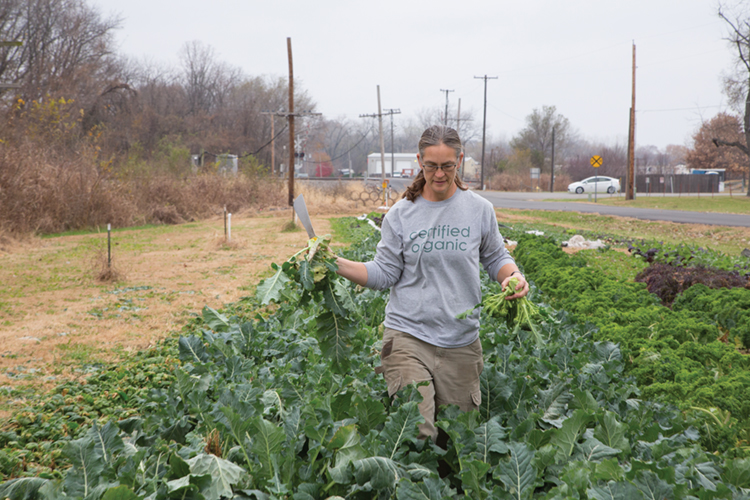
Jill Elmers harvesting fall broccoli.
Jill Elmers and Jack and Kathy Wilson could not have been farther from farming in their first careers—literally and figuratively. All were working in the city at fast-paced corporate jobs with their inner compasses pointed steadily toward the urban, corporate lifestyle.
Now, Elmers, of Moon on the Meadow farm, and the Wilsons, of Washington Creek Lavender farm, are fixtures at the Lawrence Farmers’ Market and steeped in the local farm scene, while most of their customers likely never suspect they haven’t been farming their whole lives.
As all three have learned, times change, jobs change and people change, and when that happens, anything is possible, including farming.
Jill Elmers: Acoustical Engineer to Organic Farmer and Local Food Activist
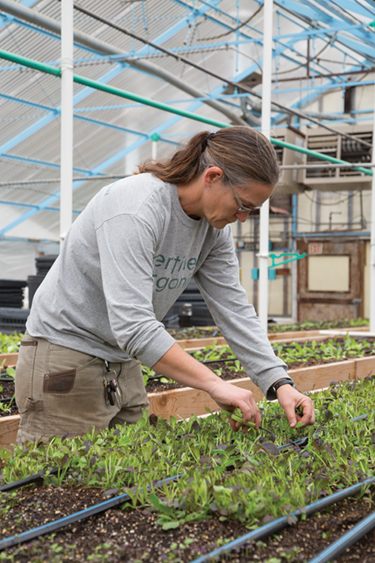
Jill Elmers tending to lettuce inside the Sunrise Garden Center.
Jill Elmers has always been proactive and a bit ahead of her time. That became evident as she was finishing high school in Arlington, Texas, and trying to decide on a college. She was trying to find a school that wasn’t too big but allowed her to combine her two biggest interests rather unconventionally.
“Ultimately, what I wanted was something that took music and engineering, and made a job out of it,” she explains.
She attended Valparaiso University, in Indiana, where she majored in electrical engineering with a minor in music, performing the violin in orchestra and also piano. In another proactive move, she helped start the university’s first women’s soccer team so she could play soccer.
In addition to her computer and electrical engineering coursework, she paid close attention to the musical equipment that bands were using, familiarizing herself with things like guitar amplifiers and digital processing equipment. That equipment was where her interests seemed to converge most logically.
As graduation neared, she sent resumes to every music equipment manufacturer she could find—to no avail. She graduated, moved to Chicago and took a job at Starbucks to pay the bills. After working there a year, one weekend, she picked up the newspaper to hunt for jobs in earnest.
“The job I had for 20-plus years was in that newspaper: designing sound reinforcement systems,” Elmers says.
She came into the job understanding the engineering and knowing something about music, but had to learn about all the ways those could combine when it came to sound systems for commercial buildings such as arenas, performing arts centers and churches. Eventually, she says the job morphed to include audio/visual design.
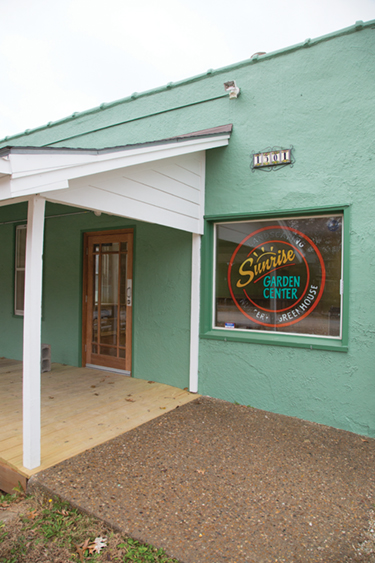
Sunrise Garden Center.
“When you go to make a sound system sound good, there is an art to that. You can use math, but still, listening is the key,” she says.
Elmers traveled all over the country, and even the world, as the Seoul, South Korea, airport was one of her projects, on which worked with architects and engineers to create systems with Avant Acoustics. She worked her way from an associate to a vice president and partner in the company. But, the travel, the deadlines and the pressure of the projects began to take their toll, and she says she got burned out.
“In 2000, I actually quit. I didn’t have another job; I had nowhere to go. At that point, I was heavily involved volunteering with Girl Scouts, and I wanted to give back more. The company president gave me the summer off and said, ‘You need a break,’ ” she says.
Elmers had always had the idea that she would like to have a self-sustaining life: off the grid, providing all her own basic needs. As part of that, she wanted to learn to grow her own food. So, that spring, she called Mark Lumpe, of Wakarusa Valley Farm, and went to work for him that summer learning about organic farming.
When it came time for her to return to her job at the end of the summer, Lumpe had a proposal for her.
“Mark said, ‘I’d like to give you some land to grow on for one of our CSAs [community-supported agriculture shares].’ I went to the company and asked to work 30 hours a week. The president said ‘yes,’ ” she says.
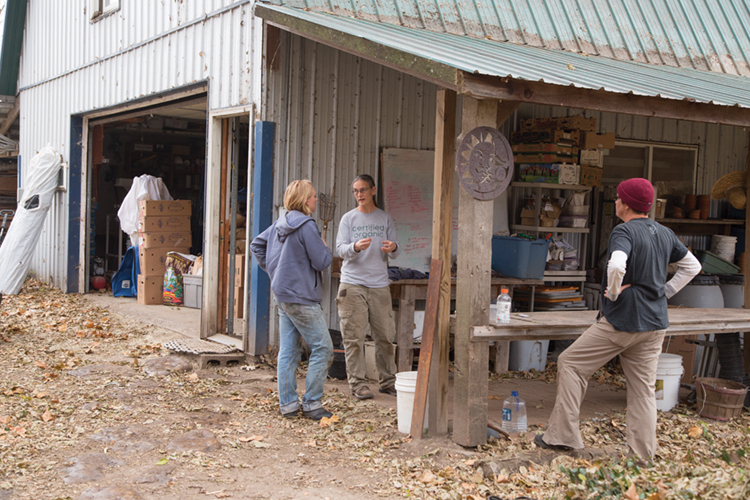
Jill talks with an employee at her Moon on the Meadow Farm.
So, Elmers worked out a schedule that involved two 10-hour workdays and two five-hour workdays at Avant, and the rest of the time, including weekends, farming.
“The transition from the farm to work on those days, from outside to sitting at the computer, was very hard,” she laments.
From working on the farm, Elmers learned that the small farm scene and local food movements around Lawrence were becoming very active. CSAs were growing in popularity, the school district launched its Farm-to-School movement, and she wanted to be involved.
In the end, she felt too strong of a pull from the farming and local food community to return to work full-time.
“Part of it also was I wanted to prove to young farmers that you can make a living doing this,” she says.
Elmers stayed on with Avant in a part-time role from 2001 to 2014, while she established her own farm and CSA program. She now lives and works on her farm just east of Lawrence, in the Kansas River bottoms, and sells CSAs as part of Common Harvest, a group of five small organic farms, nearly year-round. In the summer, she employs four to five people, and in the winter, she has two employees who tend her 6,000 square feet of hoop houses and other raised beds.
Although she continues to consult with Avant, her heart is in farming. She serves on the Food Policy Council, which is an advisory council to the city and county on all food-related issues, such as food security and insecurity. She also has been active with the local Farm-to-School program. She loves to think and talk about food, but she also still very much likes being out and about among the fruits and vegetables.
“The whole process of growing food is an amazing process from seed to harvest. I love that whole thing, and I can’t ever imagine doing anything else,” she says.
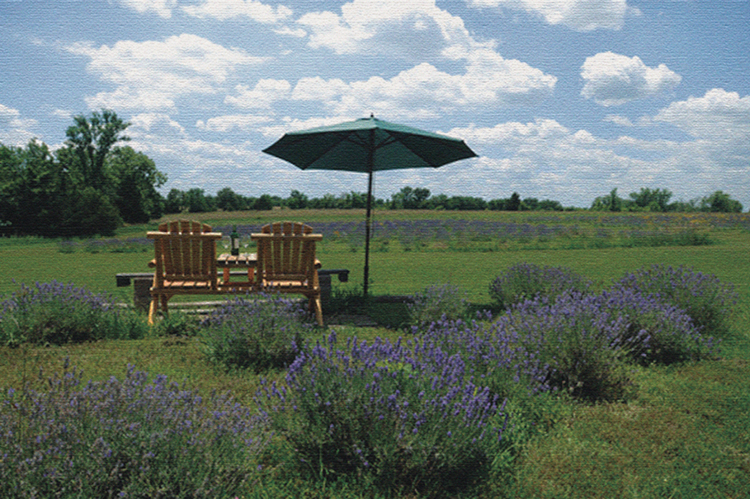
Washington Creek Lavendar
Kathy and Jack Wilson: From Food Photography and Film Production to Lavender Farming
Rarely have goats played a role in changing someone’s life, but for Kathy Wilson, that was exactly the case. Kathy was a renowned food photographer based in Chicago, having photographed more than 100 magazine covers and countless cookbooks. Photography was becoming increasingly digital, and Kathy wasn’t sure she wanted to make that technological transition with her work.
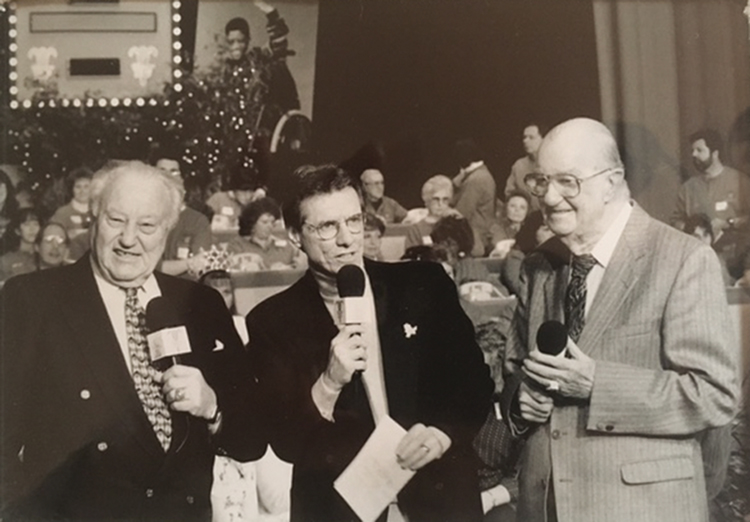
Jack Wilson hosting the Easter Seals telethon.
So, when she saw a presentation by two women who owned a goat farm, it all fell in line in her mind: She and her husband could transform her grandmother’s former dairy farm, near Clinton Lake, into a goat farm and leave the city life for the farm fields of Kansas.
That is not exactly how things worked out—no goats and different land, for example—but ultimately, Kathy did leave her successful photography career for farming. And, she convinced her husband to do the same with his career.
Jack began his career in earnest—after going to school to become a teacher and being drafted into the Army after just four weeks in the classroom—as a community relations director for a Chicago public radio station. Then, he became the vice president of marketing and development for a public television station, which led him to form his own company, JWA Video, producing national PBS programs and television specials, as well as corporate business-to-business videos.
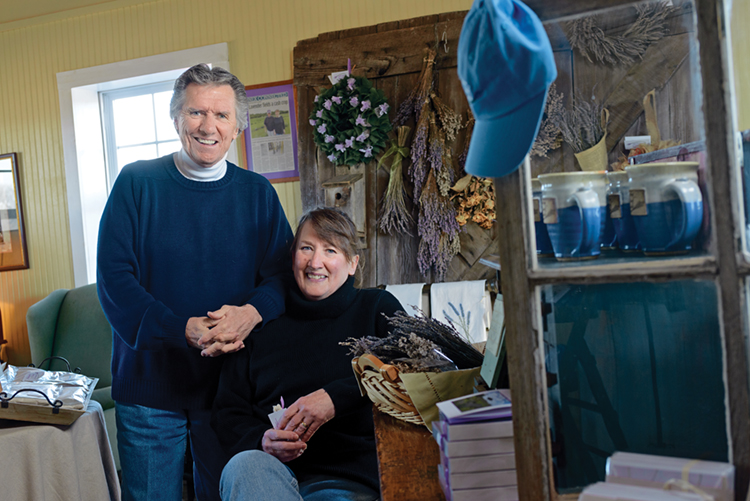
Jack and Kathy Wilson in their home at Washington Creek Lavendar
Kathy collaborated on the goat-farm idea with her sister, who is since deceased, figuring out how to make their grandmother’s property their own “Green Acres.”
“Kathy had said to me, ‘Would you ever consider moving to Kansas?’ I said, ‘As long as we’re together,’ never in life thinking it would actually happen,” Jack says.
Her grandmother’s farm turned out to lack enough space for a house and had other challenges, but Kathy was set on the idea of buying land and building a home in Kansas, where she and Jack could become farmers. She oversaw the construction of the couple’s new log home in 2004, while Jack continued to work in Chicago, as he would do for several more years, commuting between the farm and Chicago weekly.
The goat farm concept went by the wayside for various reasons, so Kathy, a master gardener, set out to find a planted crop in which to specialize. She planted more than 200 tomato plants, only to have a hail storm take them out four weeks later. Then, she planted fields of basil and found a store to purchase her crop. After waking at 4 a.m. each day and aiming the truck lights on the plants so she could pick the leaves, she received her first check, a whopping $17.45.
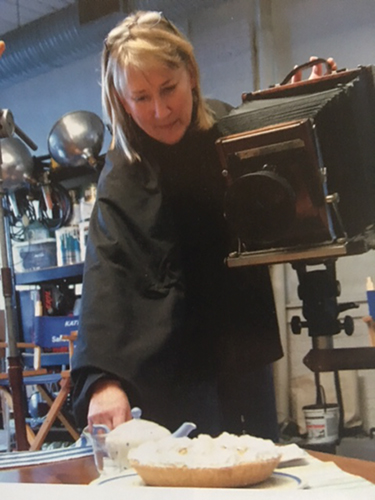
Kathy Wilson photographing one of her Better Homes covers.
She planted 800 lavender plants, only to have them all die. So, she tried another spot and another set of plants, and they died, as well. It wasn’t until they purchased some adjacent land up the hill from their house and had the soil tested by the county Kansas State Extension office that she found her farmland and her crop.
“The test said the soil was suited either for grapes or lavender. So, we started eight or 10 lavender plants on a little plot of the land, and now we have close to 6,000 plants,” Jack says.
As the farm grew, it became certified organic, and Kathy and Jack began to find outlets for their lavender products. Kathy sewed bags for sachets and other products in addition to farming, and Jack was on the farm from Thursday to Sunday each week before returning to Chicago.
Jack sold the video production company and moved to Lawrence in 2010. Since then, Washington Creek Lavender is an agritourism site, with its gift shop full of Kathy’s creations and other lavender specialties, and its fields of lavender cleverly landscaped to resemble lavender farms in Provence. The farm is a popular stop on the Kaw Valley Farm Tour and holds events throughout the year.
Lavender farming, even on well-suited soil, is not without its challenges. Too much rain causes the plants to rot, and lack of hot weather affects their growth. The Wilsons have many varieties of plants, hoping to combat blights.
“We don’t make the same mistakes twice, we make them seven or eight times,” Jack jokes. “Farming is much more an art than a science.”
Although the science can spell doom, as well: Bitter cold snaps last winter affected the plants more than ever, and the Wilsons only had about 30 percent of their harvest this year versus previous years.
Even those challenges can’t dampen the couple’s enthusiasm for their newer career.
“If anyone had told me that at my age I’d be in Kansas on a farm raising lavender and loving it, I’d never believe it,” Jack says. “We wouldn’t be doing it if we didn’t have a passion for it. If you don’t have a passion, it’s never going to work.”

10 Comments
Buy statins online discreet shipping CrestorPharm Crestor Pharm
http://prednipharm.com/# Predni Pharm
Semaglu Pharm SemagluPharm SemagluPharm
PredniPharm: generic prednisone 10mg – Predni Pharm
Semaglu Pharm: Rybelsus 3mg 7mg 14mg – Semaglu Pharm
https://semaglupharm.com/# Semaglu Pharm
Affordable cholesterol-lowering pills: Crestor 10mg / 20mg / 40mg online – Crestor Pharm
Lipi Pharm Online statin drugs no doctor visit FDA-approved generic statins online
I am so grateful for your blog.Thanks Again. Cool.
Great crypto resource, trusted always.